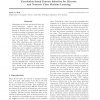Free Online Productivity Tools
i2Speak
i2Symbol
i2OCR
iTex2Img
iWeb2Print
iWeb2Shot
i2Type
iPdf2Split
iPdf2Merge
i2Bopomofo
i2Arabic
i2Style
i2Image
i2PDF
iLatex2Rtf
Sci2ools
165
Voted
ICML
2000
IEEE
2000
IEEE
Correlation-based Feature Selection for Discrete and Numeric Class Machine Learning
Algorithms for feature selection fall into two broad categories: wrappers that use the learning algorithm itself to evaluate the usefulness of features and filters that evaluate features according to heuristics based on general characteristics of the data. For application to large databases, filters have proven to be more practical than wrappers because they are much faster. However, most existing filter algorithms only work with discrete classification problems. This paper describes a fast, correlation-based filter algorithm that can be applied to continuous and discrete problems. The algorithm often outperforms the well-known ReliefF attribute estimator when used as a preprocessing step for naive Bayes, instance-based learning, decision trees, locally weighted regression, and model trees. It performs more feature selection than ReliefF does--reducing the data dimensionality by fifty percent in most cases. Also, decision and model trees built from the preprocessed data are often sign...
Correlation-based Filter Algorithm | Discrete Classification Problems | ICML 2000 | Machine Learning | Model Trees |
Related Content
| Added | 17 Nov 2009 |
| Updated | 17 Nov 2009 |
| Type | Conference |
| Year | 2000 |
| Where | ICML |
| Authors | Mark A. Hall |
Comments (0)

